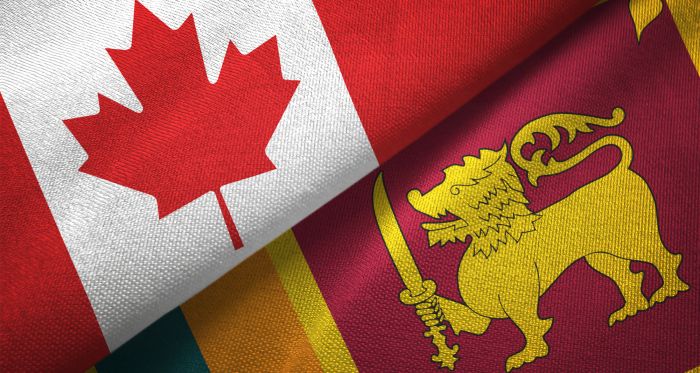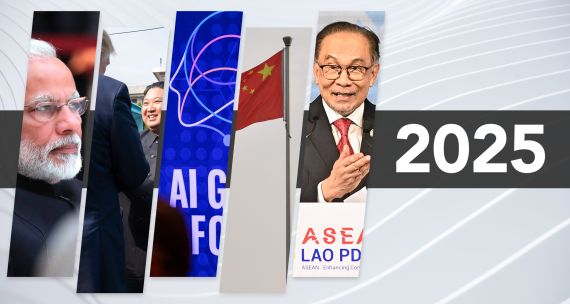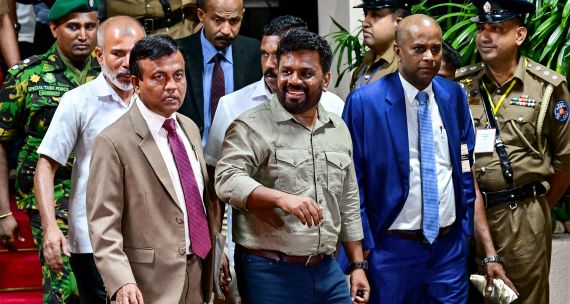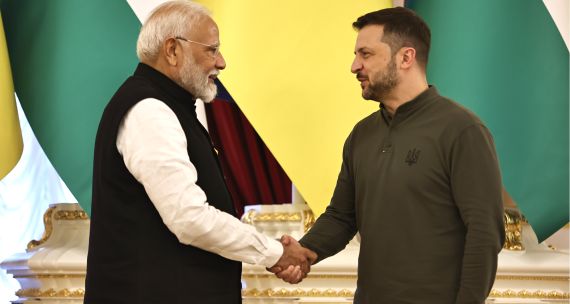Sri Lanka’s November 14 parliamentary elections did not make headlines in Canada, nor did they attract official comment from Ottawa. This is unfortunate, given that the election marked a significant democratic shift in a country where democracy, despite nearly a century of regular elections, has not always been assured. While the U.S. presidential election on November 5 likely diverted attention, Canadian domestic politics were also no doubt at play, too, at least in the official silence. Canada’s myopic approach to Sri Lanka is a reminder of the danger of being complacent about our foreign relations.
With Donald Trump’s impending return to the White House, our relationship with the U.S. will be challenged as never before. Understanding and engaging with the world beyond our continent will take on new importance, and as such, we need strong, workable bilateral relationships wherever we can find them as we pursue our interests, especially in the Indo-Pacific.
The election in Sri Lanka — Asia’s oldest democracy — was significant and worthy of attention. Who runs this Indian Ocean island matters both in the region and beyond. The country occupies a strategic location, with an estimated 40 per cent of global trade flows passing a few kilometres off Sri Lanka’s south coast; Colombo is South Asia's busiest port. It is a centre of China-India (and China-U.S.) rivalry, with all the implications that entails. And it has experienced decades of ethnic tension and divisive politics and endured a brutal civil war (1983-2009) that put it on the international agenda. Yet, the only mention of Sri Lanka in Canada’s 2022 Indo-Pacific Strategy is a single bullet point stressing human rights and the need to address human rights violations committed during the civil war.
Sri Lanka’s Voters Try to Turn the Page
In a way unthinkable a few years ago, Sri Lankan voters turned their collective back on the dynastic politicians, traditional elites, and racially charged politics that have been responsible for decades of turmoil and tragedy. In a follow-on to the 2022 mass demonstrations that chased then President Gotabaya Rajapaksa from power, the left-wing National People's Power (NPP) coalition won two-thirds of the seats as its vote went from three per cent in 2020 to 61 per cent in 2024. This win followed the remarkable victory in the September 2024 presidential election of NPP candidate Anura Kumara Dissanayake (AKD). His party, the Janatha Vimukthi Peramuna (JVP), was once a group of Marxist-Sinhalese majoritarian revolutionaries who tried violently to overthrow the government twice — first in 1971 and again through a bloody insurrection from 1987-89. The latter unfolded in southern Sri Lanka as the Liberation Tigers of Tamil Eelam (the Tamil Tigers) fought for independence in the north and east. Although AKD's origins may be Marxist, today, almost no one refers to him as such.
The NPP took the most seats in 21 of Sri Lanka’s 22 electoral districts, including the Tamil heartland of Jaffna. There, the NPP bested the traditional Tamil parties that were widely seen as not delivering for the grassroots even if their nationalist rhetoric resonates with some, including in Tamil communities overseas, of which Canada’s is the largest outside the immediate region.
It is notable that the November parliamentary election lacked the divisive rhetoric and racist overtones that defined the 2019 presidential campaign of Gotabaya Rajapaksa, and other elections before that. The optimistic view is that a broad cross-section of Sri Lankan voters had concluded that ethnonationalist politics, however seductive the rhetoric, had not ultimately been in their interest.
No doubt the global post-pandemic antagonism towards incumbents also played a role in delivering the NPP a victory, as did the traditional party leaders’ refusal to come to grips with how the political landscape had changed since the political and economic upheaval in 2022. However, for the NPP, the reality of governing amid international volatility, sustained economic crisis, and inevitable social and communal challenges will be very different than campaigning.
That said, the new government has an opportunity to take the country beyond the tragedy of its governance since independence. Its action on serious political reform will be a good indicator. Such reforms include the abolition of the executive presidency, replacement of the draconian Prevention of Terrorism Act (although there are signs that the NPP may already be wavering on this), and meaningful action on governance reform, all of which will require leadership and the expenditure of political capital. Although issues of war-time accountability and post-war reconciliation on behalf of the Tamil minority, long the focus of Canada’s engagement in Sri Lanka, were barely mentioned by the NPP, they will not disappear.
At the same time, the new government will be trying to get the economy back on track and create opportunities for its supporters, who are drawn heavily from disadvantaged communities that have borne the brunt of the economic crisis and the austerity measures required as part of the IMF bailout program following Sri Lanka’s 2022 bankruptcy.
Resetting the Ottawa-Colombo Connection
The very limited media and non-existent (at least in public) official attention in Canada to these dramatic exercises of democracy contrast with the extensive attention Sri Lanka’s civil strife and natural disasters have attracted in Canada over the decades. For the parliamentary election in November, CBC News did not run a single story. This lack of coverage may simply reflect resource constraints, but it does contrast with the aftermath of the 2019 Easter Sunday bombings, when the broadcaster and other Canadian media sent teams to Colombo to report on the carnage.
To my knowledge, Justin Trudeau has been the only international leader in recent times to put out a statement each year on the anniversary of the 1983 Black July pogrom against the Tamil community in Sri Lanka. Yet, neither the prime minister nor his foreign minister offered comment on the recent elections, perhaps because it was unclear what domestic political benefit (or damage) such comment might offer in Canada.
What do these events in Sri Lanka mean, then, for Canada in this period of turbulence and change? In my view, it is time to reset relations with Sri Lanka to put them more in line with that of other countries, and in a way that will underscore the seriousness of our commitment to the Indo-Pacific, and especially to a longstanding democracy. In the early decades of the country’s independence, Canada was a remarkably strong bilateral partner, making major investments in infrastructure and education, and prime ministers St-Laurent, Diefenbaker, and Pierre Trudeau all made visits. Paul Martin’s trip in early 2005 to assess post-tsunami damage was the last trip to Sri Lanka by a Canadian prime minister. Then-foreign minister Stéphane Dion’s visit in 2016 was the first by a Canadian foreign minister in 13 years; there has not been a ministerial visit of any kind since.
Canada’s lack of attentiveness to Sri Lanka contrasts sharply with our so-called ‘like-minded’ (e.g. Australia, France, the U.K., and the U.S.), who have cultivated well-rounded relationships with the country over many years, helping them develop an understanding and the connections necessary to engage effectively, especially on difficult issues. In this vein, an early visit by, for example, the Canadian foreign minister to meet the new Sri Lankan government and others, including the opposition and representatives from civil society, would send a signal that Canada supports Sri Lanka’s democracy, recognizes the significance of the political change taking place, and is interested in deepening the relationship. Even a phone call would be a step in the right direction if events elsewhere in the world preclude an early visit.
While some argue that boosting Canada's influence in multilateral organizations requires more resources in places like New York and Geneva, the reality is that strong bilateral relationships are crucial to our presence in global fora. Although resources and leadership in multilateral missions can complement and leverage strong bilateral relations, they cannot compensate for their absence (Canada’s two failed bids for a term on the UN Security Council are a case in point). Canada cannot focus just on relationships with countries we “like” or think are like us. The democracies vs. autocracies rubric, while popular in some quarters in Canada, particularly those prioritizing values at the expense of broader interests in foreign policy, is naïve and unhelpful. All things being equal, democracies are preferable to autocracies, but democracies come in many forms, and they may not always manifest in a way that fits Canadians’ worldview.
Furthermore, assuming a democracy will automatically see the world as we do is unrealistic, especially when we prioritize transmitting those assumptions rather than listening to our counterparts. Countries understand when they are being patronized and react accordingly. Therefore, we need constructive and professional relationships built on an understanding of our mutual and differing interests, which will include values.
Engaging with Sri Lanka, whose democracy and history are complex, requires balancing Canada’s values and domestic politics with its strategic interests. An overly simplistic, ideological approach risks isolating Canada from partnerships that could enhance our economic, security, and diplomatic objectives in the Indo-Pacific.
• Edited by Erin Williams, Senior Program Manager, Vina Nadjibulla, Vice-president Research & Strategy, and Ted Fraser, Senior Editor, APF Canada





